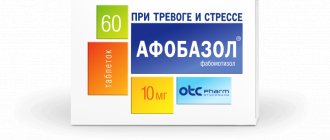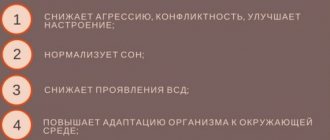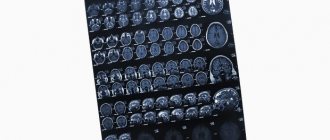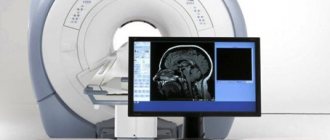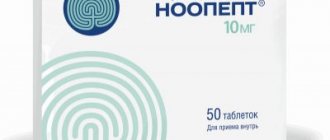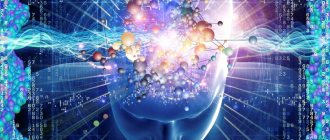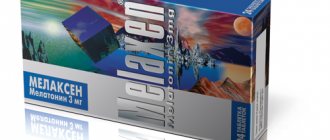Action of phenibut
It has several different effects on the nervous system and mental state:
- Reducing anxiety and fear.
- Normalization of sleep, making it easier to fall asleep.
- Nootropic effect: by improving the metabolism of nerve cells, attention, memory and reaction speed are improved.
- Relieves symptoms of dizziness, stuttering, enuresis and tics in children.
- Anticonvulsant action.
- Analgesic effect.
- Improves endurance.
The mechanism of action is complex and is associated with a direct effect on GABA receptors, which leads to increased inhibition processes caused by gamma-aminobutyric acid.
Also, by improving blood microcirculation in the small vessels of the brain and reducing the processes of lipid peroxidation, it helps restore normal metabolism of nerve cells (neurons). Thus, it combines the effect of a tranquilizer (sedative) and a nootropic-vascular drug.
Meeting the main contender
Phenibut is a nootropic drug that has anxiolytic activity.
Included in the group of psychostimulants. This drug is prescribed for various neuralgic and neurotic disorders. Indications for use of the drug are based on the ability of the drug to activate metabolic and bioenergetic processes in the brain. As a result, the transmission of nerve impulses to the central nervous system from the brain is stabilized and its blood circulation is normalized.
Scope of application
The drug is used in the following cases:
- for sleep disorders, frequent nightmares, insomnia;
- during urinary retention, which is caused by myelodysplasia;
- during Meniere's disease;
- prevention of anxiety states that arise before painful diagnostic examinations and surgical interventions;
- for anxious neurotic and asthenic conditions - fear, anxiety, psychopathy, obsessive-compulsive neurosis, enuresis, for stuttering and tics in children;
- used in combination with detoxification agents during delirious and predelirious states in alcoholism;
- for dizziness caused by dysfunction of the vestibular analyzer;
- during the relief of psychopathological and somatovegetative disorders that are caused by withdrawal symptoms;
- with primary open-angle glaucoma.
Advantages and disadvantages of the product
The advantages of the drug include the following features:
- while taking the drug, blood circulation in the brain increases, which helps improve its performance;
- the product improves memory, attention, normalizes mental performance;
- increases the speed and accuracy of sensory and motor reactions;
- reduces the level of cerebral vascular tone, which reduces the risk of stroke;
- when taken, the drug has a high anticonvulsant effect;
- relieves feelings of fear and severe tension;
- eliminates sleep disorders and relieves insomnia;
- has an antioxidant effect;
- prevents various manifestations of asthenia;
- improves microcirculation in eye tissues.
However, despite the advantages, Phenibut has disadvantages, which provokes many people to look for its analogues, which do not have them. Among the disadvantages, it should be especially noted:
- the presence of contraindications - it is not recommended to take this drug if you have the following conditions - hypersensitivity to the components of the drug, with liver failure;
- should not be taken during pregnancy and breastfeeding;
- not recommended for children under 8 years of age;
- after taking there are sometimes side effects - a feeling of anxiety, agitation, headaches, increased irritability, dizziness, a feeling of drowsiness, nausea may appear at the first dose, and sometimes allergies may appear in the form of itching and irritation;
- if long-term use of the drug is required, then it is necessary to monitor the picture of peripheral blood conditions and the condition of the liver.
Before you start taking the drug, you need to study the instructions in detail, since Phenibut has numerous contraindications and a large number of side effects, and also analyze analogues of the drug available on the market.
Indications for use
Phenibut is prescribed for both disease and non-painful conditions.
- Stress, overwork, lack of sleep, preparation for physical and mental stress and operations.
- Asthenia (asthenic syndrome, neurasthenia, VSD, astheno-neurotic state).
- Tension headache.
- Anxiety disorders: panic attacks, generalized anxiety disorder, phobias (fears).
- Neuroses, neurosis-like states.
- Personality disorders.
- Consequences of organic damage to the nervous system.
- Withdrawal state due to alcohol, drug addiction, smoking.
- Dizziness, Meniere's disease, motion sickness.
- Insomnia.
- Psychosomatic diseases.
- In children: stuttering, tics, enuresis, aggressiveness, developmental delay.
A prerequisite for taking phenibut is a doctor's prescription. Self-use is prohibited!
Other popular analogues for therapeutic action
Below are the most popular similar Phenibut products, which have different components with this medication, but the same therapeutic direction. The effectiveness of these analogues is no lower than that of the original product.
Cerakson
Ceraxon is produced in the form of an oral solution and for injections. The main component in the medicine is citicoline sodium. This medication is used in the treatment of stroke and pathological disorders of blood flow in the brain. The medication is also used in complications after impaired blood supply to parts of the brain.
The drug is effective in the treatment of brain and skull injuries, and neurological pathological abnormalities - vascular and degenerative etiology.
Mechanism of action of Ceraxon
The drug is not prescribed for:
- sensitivity to the ingredients of the drug;
- vagotonia;
- fructose intolerance;
- lactation.
Ceraxon is prescribed with restrictions during pregnancy. The injection solution is prescribed three times a day, 1 ml for children, 2 ml for adults. The drug can be used for children from the moment of birth. The duration of treatment is 45-60 days.
In case of a brain disorder or stroke, treatment must begin in the first hours after the attack. The dosage and duration of therapy are determined by the doctor individually for each patient, based on the pathology and the degree of its progression.
Side effects:
- heart rhythm disturbances and blood pressure fluctuations;
- headache;
- dyspepsia;
- vertigo;
- hallucinations;
- dermatological allergic reactions.
Anvifen
Anvifen is a nootropic drug that acts on GABA receptors. The drug has the following properties:
- antiplatelet and tranquilizing;
- antioxidant and anticonvulsant.
The drug is prescribed for the following patient conditions:
- insomnia in older people;
- asthenic condition;
- anxious-neurotic state;
- Meniere's pathology and vestibular disorders;
- kinetosis;
- psychopathological disorders.
Pharmacological properties of Anvifen
It is prohibited to use Anvifen in therapy if:
- manifestation of an allergy to the composition of the medication;
- GV;
- pregnancy, as well as in pediatrics up to 3 years.
Use with restrictions for:
- kidney and liver dysfunctions;
- ulcerative destruction in the digestive organs.
The medication must be taken in courses over 2-3 weeks. There are 3 procedures for taking capsules per day:
- Patients over 14 years of age – 250-500 mg.
- Children 3-8 years old – 50-100 mg;
- Children 8-14 years old – 250 mg.
- For Meniere's pathology - 250 mg for 2 weeks.
Negative reactions of the body to the drug:
- skin allergies - hives, itching and redness of the skin;
- irritability and nervousness;
- headache;
- severe drowsiness.
Biotropil
Biotropil is a nootropic medication with a psychostimulating effect. The drug is based on the main component - piracetam, which is a cyclic derivative of gamma-aminobutyric acid.
The main indicators for prescribing Biotropil are the following violations:
- cognitive;
- myoclonus of cortical origin;
- decreased mental abilities.
Myoclonus
Phenibut analogue is not prescribed for the following reasons:
- hypersensitivity to the ingredients of the drug;
- renal failure;
- hemorrhagic stroke (hemorrhage);
- Huntington's chorea;
- the patient's age is less than 18 years;
- lactation.
The medication is prescribed with caution during pregnancy due to the lack of information about the safety of the drug during this period.
Daily recommended dosages (taken in 2-3 doses during the day):
- restoration of cognitive functions and memory - initial dosage 4800 mg, maintenance therapy - 1200-2400 mg;
- myoclonus of cortical etiology – 24 g for the first 3-7 days, after which the dosage is reduced to 1200 mg per day.
Patients with renal pathologies require a downward dose adjustment.
Negative effects:
- hyperkinesia and ataxia;
- disturbance in coordination and balance;
- insomnia or severe drowsiness;
- epileptic seizures and severe headaches;
- weight gain;
- hallucinations, depression and overexcitement;
- hemorrhages;
- dermatitis and other manifestations on the epidermis;
- increased sexual activity;
- asthenia;
- dyspepsia.
Phenibut addiction
With prolonged, uncontrolled use of phenibut, mental and physical dependence may develop. This may require special treatment from a psychiatrist-narcologist and subsequent rehabilitation. As a rule, cases of dependence on phenibut were observed in persons dependent on psychoactive substances who had a long history of drug addiction and who switched from using the drug to phenibut. The development of primary dependence on phenibut only after long-term use is extremely rare.
Indications for use of Phenibut
The medicine is prescribed for the following disorders and abnormalities:
- asthenia;
- increased anxiety;
- fears;
- neuroses;
- mental disorders of various etiologies;
- delayed speech and development, especially in childhood;
- sleep disorders;
- prevention of anxiety before operations and diagnostic tests;
- Meniere's disease;
- prevention of motion sickness;
- glaucoma;
- alcoholism;
- heart rhythm disturbances.
Phenibut can be used as an independent remedy or as part of complex therapy for these diseases.
Phenibut analogs
If you are looking for what can replace Phenibut for an adult or child, complete analogs with different prices and identical composition and properties will be good alternatives. The list includes the following drugs:
- Anvifen;
- Noofen;
- Phenorabine;
- Nootrophen;
- Noobut;
- Bifren.
Such products differ from manufacturer to manufacturer. Prices for Phenibut analogues in tablets differ, which makes it possible to select treatment for all categories of patients.
Analogues of action with different compositions include the following drugs:
- piracetam-based products - Lucetam, Nootropil, Piracetam;
- Glycine;
- preparations with hopantenic acid - Cognum, Pantocalcin, Pantogam;
- medications with GABA - Aminalon;
- neuropeptidase agents - Cerebrolysin, Cortexin, Actovegin, Solcoseryl;
- drugs with pyritinol - Encephabol;
- analogues based on vinpocetine - Cavinton, Vinpocetine, Bravinton;
- medications with cinnarizine - Stugeron, Cinnarizine, Vertizin, Cyrizin;
- combination drugs with cinnarizine and piracetam - Fezam, Omaron, Neuro-Norm;
- analogues based on mebicar - Adaptol, Mebicar;
- Picamilon;
- Phenibut analogs that can be bought on IHerb (USA) - California Euro Herbs “Passion Flower”, NOW foods Valerian root, KAL Magnesium L-threonate, any dietary supplements with magnesium, CALM The antistress drink mix, Onnit Alfa Brain;
- nootropic drugs with hydroxypyridine - Mexidol, Neurox, Mexiprim;
- Pramistar;
- Strezam;
- analogues with phenylpiracetam - Phenotropil;
- homeopathic medicines - Nervo-Heel, Tenoten;
- citicolines - Ceraxon, Neuroxon;
- idebenones - Noben, Celestab, Neuromet;
- herbal and sedative analogs - Persen, Sonobarboval, valerian, Novo-Passit, Donormil, Dormiplant, Alora, Sondox, Valokormid.
The following potent prescription drugs, antidepressants, tranquilizers, sleeping pills can be considered analogues:
- Fluoxetine;
- Prodep;
- Paxil;
- Emoton;
- Medopram;
- Fevarin;
- Grandaxin;
- Sonapax;
- Diazepam;
- Eglonyl;
- Gidazepam;
- Amitriptyline;
- Afobazol.
The prescription of such drugs is carried out only by a doctor if there are strict indications.
List of Phenibut analogues with prices
| Drug name | Active substance | Release form | Manufacturer | Minimum packaging cost |
| Phenibut | Aminophenylbutyric acid | Pills | Olaifarm, Latvia | From 400 rub. |
| Noofen | Capsules | From 1150 rub. | ||
| Anvifen | Rafarma, Russia | From 320 rub. | ||
| Adaptol | Mebicar | Pills | Olaifarm, Latvia | From 675 rub. |
| Afobazole | Fabomotizol | Pharmstandard, Russia | From 350 rub. | |
| Phenazepam | Benzodiazepine | Ampoules, tablets | Valenta, Russia | From 200 rub. |
| Picamilon | GABA | Pharmstandard, Russia | From 140 rub. | |
| Fezam | Cinnarizine, piracetam | Capsules | Balkanfarma, Bulgaria | From 280 rub. |
| Glycine | Glycine | Lozenges | Evalar, Russia | From 130 rub. |
| Persen | Valerian, lemon balm, mint | Tablets, capsules | Sandoz, Switzerland | From 280 rub. |
| Paxil | Paroxetine | Pills | GlaxoSmithKline, Poland | From 660 rub. |
| Grandaxin | Tofisopam | EGIS Pharmaceutical, Hungary | From 320 rub. | |
| Tenoten | Homeopathic dilutions of antibodies to brain-specific protein | Materia Medica, Russia | From 320 rub. | |
| Amitriptyline | Amitriptyline | Tablets, ampoules | Ozon, Russia | From 45 rub. |
| Cerakson | Citicoline | Oral solution, ampoules, tablets | Ferrer International, Italy | From 650 rub. |
Phenibut or Glycine - which is better for an adult?
Manufacturer: Evalar, Russia
Release form: lozenges
Active ingredient: glycine
Glycine is a mild product based on a natural amino acid. This over-the-counter analogue, like the drug Phenibut, improves metabolism in the brain, protects against stress, calms, improves attention and memory in children and adults.
Used sublingually from 3 years of age. Possible use for epilepsy attacks. The drug is well tolerated and does not cause addiction.
The effects of taking Glycine are less pronounced than those of Phenibut.
